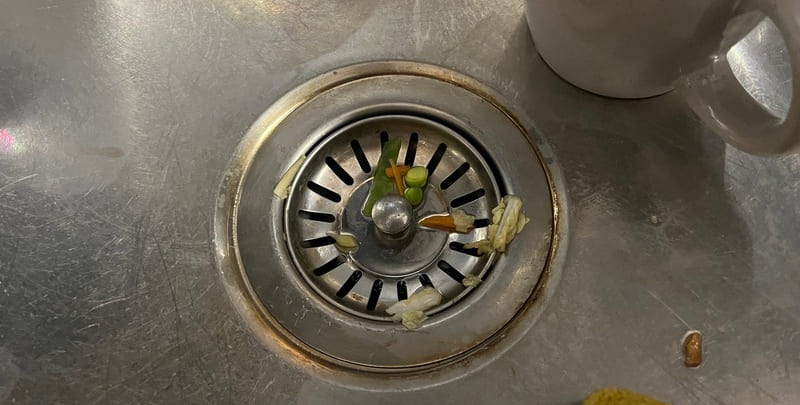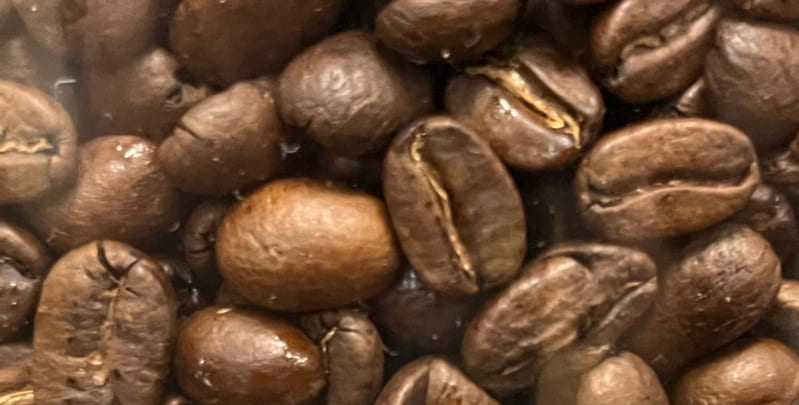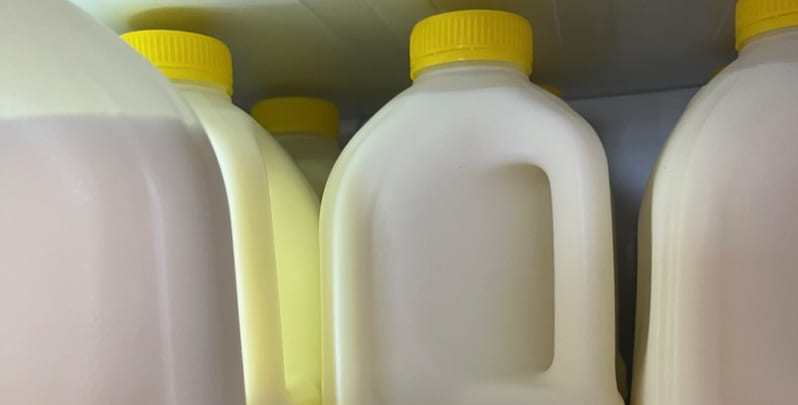Most people treat their kitchen sink like a trash can, tossing anything down the drain without a second thought, assuming it will just disappear. But what they don’t realize is that this habit can lead to serious plumbing problems later on.
It’s only when your sink starts to slow down or completely clogs that you begin to understand the consequences of what you’ve been flushing away. The drainage system is more complex and sensitive than many people realize, and allowing the wrong things to go down the drain can cause long-term damage to your home’s plumbing.
That’s why it’s important to be mindful of what you’re putting in your sink. Here are five common items you should never throw down your kitchen drain — and why.
1. Food Waste
It’s easy to get lazy after a meal and just rinse off leftover food into the sink. But many types of food waste can accumulate in your pipes and cause blockages over time. Items like pasta, rice, and starchy foods absorb water and expand, creating thick sludge that blocks the flow of water.
Other culprits include eggshells, corn husks, bones, and bacon grease. These substances may seem harmless at first, but they can build up in your pipes and eventually lead to costly repairs. Always use a trash bin for food scraps instead of the sink.

Excess Flour
Flour is another item that can cause serious issues if poured down the drain. It mixes with water and creates a sticky paste that clings to the inside of your pipes. Over time, this buildup can lead to clogs that are difficult to remove without professional help.
2. Cooking Oils and Fats
Pouring oil down the drain might seem harmless, but it’s one of the most common causes of blocked drains. When oil cools, it solidifies and sticks to the walls of your pipes, creating a thick layer that traps other debris and eventually leads to a full blockage.
The best way to dispose of cooking oil is to let it cool, then pour it into a sealed container and throw it in the trash. Never pour it down the sink, even if it’s hot or cold.
3. Produce Stickers, Paper, and Packaging
Many people don’t think twice about peeling off fruit stickers and letting them wash down the drain. However, these small plastic pieces can accumulate in your pipes and cause blockages over time.
Same goes for paper products, such as napkins, tissues, or packaging materials. They don’t break down easily and can get stuck in your drain, leading to clogs and unpleasant smells.
4. Coffee Grounds
Coffee grounds might seem like a natural choice for disposal, but they can actually cause major issues in your plumbing. They tend to clump together and form a dense mass that blocks water flow, especially in older pipes.
If you have a compost bin, consider using it for coffee grounds instead of the sink. It’s an eco-friendly and effective way to manage your waste.

5. Paint and Chemicals
Paint, cleaning solvents, and other chemicals should never be poured down the drain. These substances are harmful to both your plumbing and the environment. They can corrode pipes, pollute water systems, and even harm wildlife.
Instead, look for local recycling programs or hazardous waste disposal services. Properly disposing of these materials helps protect your home and the environment.
Bonus: Milk and Dairy Products
Milk, cheese, and yogurt might not seem dangerous, but they can cause problems in your plumbing. These liquids have high oxygen demand and can promote bacterial growth, leading to foul odors and potential blockages.
Always dispose of dairy products in the trash, not the sink. This simple step can save you from future plumbing headaches.

What Can I Actually Put Down My Sink?
In short, only water and soap should go down your kitchen sink. Everything else—solid objects, oils, chemicals, and more—should be disposed of properly in the trash or through appropriate recycling channels.
If you're unsure how to handle something, always check local guidelines. Being responsible with your waste not only protects your home but also helps preserve our environment.
What If I Have a Garbage Disposal?
Even with a garbage disposal, some items can still cause problems. Grease, coffee grounds, and starchy foods can still clog your pipes, despite being broken down by the unit. A garbage disposal isn’t a substitute for proper waste management.
Use it wisely and continue to throw food scraps in the trash. That way, you’ll avoid unnecessary plumbing issues and keep your drains running smoothly.
Should I Get a Compost Bin?
A compost bin is a great investment for any kitchen. It allows you to safely dispose of organic waste like coffee grounds, fruit peels, and vegetable scraps. Not only does this reduce the risk of clogged drains, but it also helps enrich your garden soil.
If you can’t compost, make sure to use the trash bin instead of the sink. Every small action adds up when it comes to maintaining a clean and functional plumbing system.
What Should I Do If I Suspect Clogged Drains?
If your sink is draining slowly or has stopped completely, it could be a sign of a clog. While some minor blockages can be cleared with a plunger or drain snake, more severe cases may require professional assistance.
Don’t try to force things through the drain, as this can damage your pipes. Instead, contact a licensed plumber who can diagnose and fix the issue quickly and safely.
Please note: This information is for general guidance only. Regulations vary by location, so always consult local authorities or a professional before making any changes to your plumbing system. For more details, please review our Terms & Conditions here.
Ningbo Actmix is a professional manufacturer of the Zinc dialkyldithiophosphate salt. It is non-staining specialty accelerator for rapid vulcanization of EPDM and other synthetic rubbers ,not containing any secondary amines which can form N-nitrosamines; With excellent non-blooming characteristic and dispersion.
The Zinc dialkyldithiophosphate salt is a special accelerator for EPDM which contains sulphur, ZnO, thiazoles and thiurams accelerator. It can lead to high degree of cross-linking and non-blooming with maximum usage dosages recommended.
Actmix ZDTP-50, Actmix ZBOP-50, Actmix TP-50, Actmix ZBPD-50, Curekind ZDTP/S, Curekind TP/S, we have full REACH registration.
Zinc Dialkyl-Dithiophosphate,New ECO-Friendly Rubber Accelerator, ZDTP/S,Zinc Dialkyl Dithiophosphate,Zinc Dialkyl Dithiophosphate Lubricant Additives
Ningbo Actmix Rubber Chemicals Co.,Ltd. , https://www.predispersedchemical.com